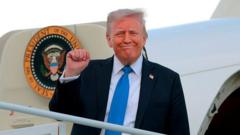Germany's government enters a new chapter with Friedrich Merz taking the helm as Chancellor after months of stalemate, promising economic revitalization and increased global influence amidst a backdrop of far-right opposition.
Germany's Political Landscape Shifts as Merz Takes Office

Germany's Political Landscape Shifts as Merz Takes Office
New Chancellor Friedrich Merz aims to revitalize Germany's economy amid rising political tensions
Germany's parliament is preparing to officially appoint conservative Friedrich Merz as the new Chancellor, a decision that marks the end of a prolonged political deadlock following the collapse of the previous administration. At 69, Merz has already signed a coalition agreement with the Social Democrats (SPD) and is focusing on crucial issues such as economic stability and enhanced international engagement. “It's our historical duty to make this government a success,” Merz declared on Monday.
Despite his plans to tackle pressing issues including immigration reforms, infrastructure investment, and renewed alliances with key European countries, Merz's coalition—comprising the Christian Democratic Union (CDU), Christian Social Union (CSU), and SPD—holds only a slim majority in parliament with 328 seats, just 12 above the threshold for governance.
In the aftermath of February's federal elections, support for the CDU/CSU saw a modest increase, while the SPD experienced a significant drop in approval, marking its worst performance in the post-war era. The challenges ahead are considerable, and Merz’s approach will be closely scrutinized, especially his plans for modest, responsible governance and public perception.
Merz has already initiated steps to amend Germany's stringent fiscal policies, particularly regarding defense expenditures, seeking to gain a mandate for increased military investment in an era of rising geopolitical threats. Claudia Major, a senior vice president at the German Marshall Fund, noted that the necessity to bolster defense spending would demand significant public persuasion.
As Merz seeks to fortify Germany’s ties with the United States and balance domestic sentiments regarding international alliances, he faces a formidable opposition in the form of the far-right Alternative für Deutschland (AfD). With their growing influence, calling for restrictive border policies and an end to military support for Ukraine, the AfD raises pressing questions about Germany's political direction. Recently designated as an extremist organization by domestic intelligence, the AfD has challenged this classification while garnering support from prominent figures in the Trump administration.
Merz's relationship with the far-right will be a determining factor as he embarks on his term in a politically fraught environment. His upcoming diplomatic missions to Paris and Warsaw highlight a commitment to repairing strained ties and reassuring European partners of Germany's leadership role within the EU framework. Agnieszka Pomaska, chair of the European Union Affairs Committee in the Polish parliament, underscored the need for renewed military cooperation, suggesting that previous German leadership under Olaf Scholz lacked decisiveness.
The coming months will reveal how Merz navigates the complexities of his coalition government, the rising challenge from the AfD, and the broader international landscape as Germany looks to assert its position in European and global affairs.



















